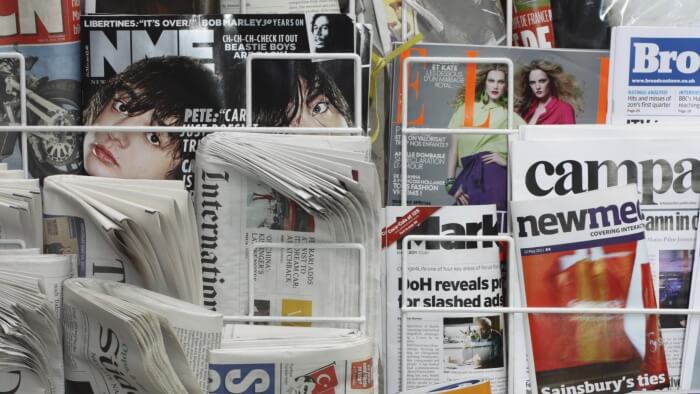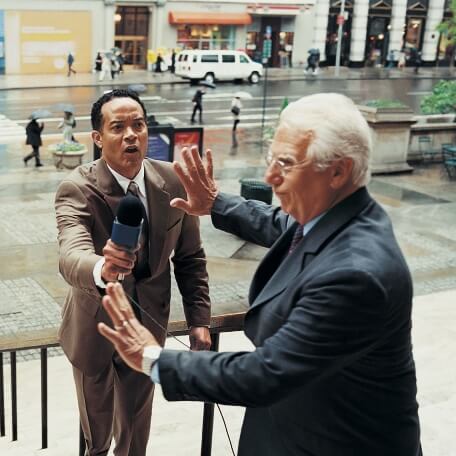Some people have a knack for selling a story. For the rest of us, here's an insiders view of what it takes to develop a strong media presence on the cheap.
How To Get Consistently Good PR
Some people have a knack for selling a story. For the rest of us, here's an insiders view of what it takes to develop a strong media presence on the cheap.

Freelance PR professional Sara Teiger started her business at the age of 25 with just four years PR, copywriting and marketing experience behind her. Here she explains how hard work, flexibility and lucky breaks all came together to give her a steady stream of clients.
How did you come to work for yourself?
I'm afraid there was no great master plan. I had a major disagreement with my boss at the bar and restaurant company where I worked as marketing manager. I knew there was no turning back and I walked out.
Right away I phoned a friend, who took me out for a drink and decided on my behalf that getting plastered was the best strategy to deal with the shock. I declined and stuck to pot after pot of tea as we talked it through.
I needed a clear head as I knew that from the next morning I would be self employed and had to start making some money. I'd bought my first house just six months previously so the pressure was on.
"Ask yourself whether you have the time to put in to PR yourself. PR is not an activity to can just hand over"
What was the thinking behind your business?
Initially, the thinking was just earn some money doing whatever I could - and fast. I had just four years PR, copywriting and marketing experience behind me, but at the time, that seemed plenty.
In the early days of self-employment I did all sorts of things: I raised some funding and ran a newspaper in a primary school, I churned out hundreds of bar and restaurant reviews for various online start ups for either a few quid or a free meal, I did some 'competitive intelligence' work for a friend's company and then I got my first proper PR client.
How did you get your first clients?
I was only 25 when I started out and received some help from the Prince's Trust. I managed to impress my mentor and he contracted me to do some PR for his franchise. I decided that franchising might as well be my speciality and then went after other franchised companies.
I can remember attending the Franchise Show in Manchester and selling myself to the marketing people on the stands. By chance, a group email landed in my inbox and the sender had mistakenly put the names of all the marketing managers of the major franchisors in the to box instead of bcc-ing them. I took the opportunity, made some meetings and got myself my second client.
How has the business developed over the years?
Franchising didn't turn out to be my speciality after all, although I do currently work for two franchisors. Almost 15 years on, my clients are mainly SMEs - often start-ups. I also frequently work for charities, local authorities and arts organisations. It's a perfect mix for me. I love it.
I had my first child in 2008 and a second in 2011. I feel very fortunate that I had already established myself as a freelance PR before having children. Obviously working around children is never easy, but my working life is much more flexible than that of my employed friends.
What is the biggest challenge you face?
As I work part-time from home and my day is structured around the school run, fitting everything in is my biggest challenge. On the positive side, I no longer suffer from writer's block as I don't have time. It's amazing how a shorter working day makes you stop procrastinating and just get on with things.
How did you overcome it?
I'm learning to be more realistic about how much work I take on and am getting better (some days) at saying no. I was pretty clear from the start that I didn’t want to grow an agency: I like doing PR, not managing other people to do it.
What do you think are the ingredients of a good PR campaign?
Novelty, controversy, research, timeliness and celebrity.
What would you say to a start-up who can’t afford PR but wants to be seen?
(1) Make the time to do your own PR. You have to prioritise it. Set aside a few hours (at least) each month. You will probably hate it. I hate doing my own PR. It’s embarrassing promoting yourself. But if you don’t have the budget to outsource, then just grit your teeth and get on with it.
(2) Think about where you want to be seen. Study those publications and websites really hard and look for opportunities. Are there regular features you could contribute to? What kinds of stories do they like? Spot and opportunity and then make your pitch. Email is your friend. Don’t work yourself up into a state about picking the phone up. Email.
(3) As an add-on to media relations, start doing your own social media. Don't just jump in there. Watch what your competitors are doing first.
Name a great PR campaign and tell us why it worked?
The Nutribullet springs to mind. I’m sure it’s just a blender despite what its legions of devotees say. But that hasn’t stopped it being featured everywhere in the first part of 2015. Its claim to break down the cell walls of fruits and vegetables making them more digestible sounds pretty bogus to me, but nobody else seems to want to let science get in the way of their wholesome juicing fun.
Which famous person has good PR, do you think?
Stephen Fry always comes up smelling of roses
What is your best advice to people who want to commission a PR agency?
Do you really want to commission an agency, or would you get better value from a freelance consultant?
Regardless of which you choose, be clear with your brief. What are you hoping to achieve with PR? Who are you hoping to communicate with? Do you have an idea of your key media targets? What are the messages you are hoping to communicate? What outcome would you consider to be a success?
But before either of these steps you absolutely must ask yourself whether you have the time to put in to PR yourself. PR is not an activity to can just hand over. For a PR agency or consultant to be able to help you, you need to make yourself available to them and to prioritise taking part in any media opportunities that they arrange for you.
Otherwise, you might as well just nail a stack of £50 notes to a board and set fire to them each month. But make sure you call the papers first.
Sara Teiger can be contacted at stpr.co.uk
Thanks for signing up to Minutehack alerts.
Brilliant editorials heading your way soon.
Okay, Thanks!



